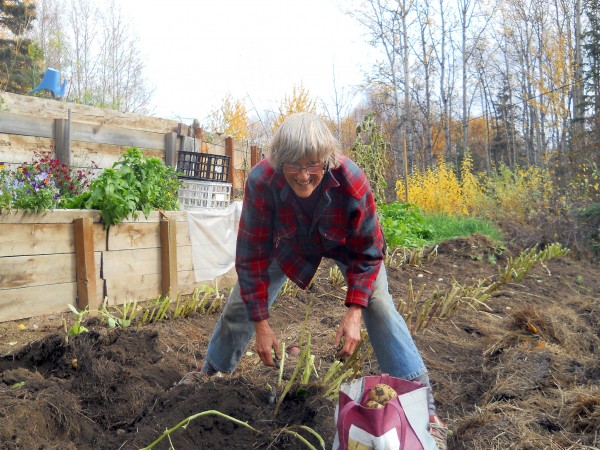Terry Reichardt shares her 'green thumb' knowledge
February 27, 2014

907-474-5042
2-27-14
Terry Reichardt has been growing food ever since she could find a square inch of soil for planting.
The first year she and her husband were married, their apartment building had a tiny piece of land behind it.
“We grew a pile of vegetables,” Reichardt recalled.
The goal at first was to save money, but it has since evolved into a commitment to sustainability, health and self-sufficiency.
“Plus it tastes better,” she said.
Reichardt shares her gardening techniques through the Osher Lifelong Learning Institute, a program at the University of Alaska Fairbanks. Her class, “Growing Things to Eat,” has been attracting students for seven years. OLLI first asked Reichardt to teach something else, but she said she’d rather teach gardening. She also offers the same course each fall at First Presbyterian Church.
“I want to encourage as many people as possible to grow some or all of their food,” she said. “I also teach how to cook, store, prepare and not waste food.”
Reichardt advocates growing one’s own food in part because she believes agribusiness harms the world's less powerful people. “I’m a Christian, and I really think we are our brother’s keeper,” she said.
She is concerned about the effect of pesticides on farm workers and their children, global warming and the harm from agricultural products to coastal communities.
“In a home garden, you can grow your own food without pesticides and herbs,” she said. “The little things we do at home have tremendous impact throughout the world.”
Reichardt grew up in rural Pennsylvania in a gardening family.
“Most people my age grew up gardening,” she said. “Times have changed.”
She earned degrees in chemistry and English at the University of Wisconsin-Madison. At her first job, her boss won the Nobel Prize for medicine.
She and her husband Paul Reichardt, now a University of Alaska Fairbanks professor emeritus and former provost, came to Alaska in 1972. She home-schooled the couple’s three children and later founded Love INC, a Christian nonprofit that helps people in need, which she ran for 16 years. In retirement, she enjoys teaching adults to read.
When the children were young, the family raised goats, chickens, turkeys and rabbits. Today, the Reichardts prefer hunting and fishing to caring for livestock.
“But I miss the manure,” Reichardt said.
At their Goldstream Valley home, they grow all their vegetables and have enough to share with friends. “We grow corn, tomatoes, cucumbers, peppers, squash, but no tropical fruits.”
The advice she gives is simple, yet solid.
“We all know that sun, water and soil are important,” she said. “In Alaska, one of the most important things is the variety of plants you grow. Our conditions are unique enough that the typical varieties from the Lower 48 won’t work. There are hundreds of varieties of tomatoes. You need to get the kind of plant that works not just in the Interior but in your particular garden.”
The results of teaching people to grow food are satisfying.
“I love the success stories,” Reichardt said. “I was in the supermarket Monday and a former student told me what a fabulous garden she had. I love hearing that. It’s fun.”
Reichardt’s goals are to grow the most and best food for the least amount of work and to serve God and people as much as possible. When not gardening, she enjoys cross-country skiing, hunting, fishing, family time, hiking and backpacking.
OLLI is a University of Alaska Fairbanks program for people 50 and older. The annual fee is $35. Most courses are $15. Reichardt’s gardening class is $30. It meets on Wednesdays from 1-3 p.m. from March 5 to April 23. Visit www.uaf.edu/olli/ for more information or call 474-6607.
This column is provided as a service by the UAF School of Natural Resources and Agricultural Sciences and the Agricultural and Forestry Experiment Station. Nancy Tarnai is the school and station’s public information officer. She can be reached at ntarnai@alaska.edu


